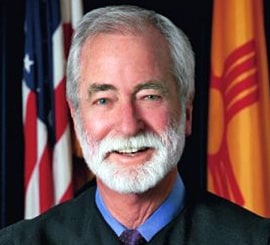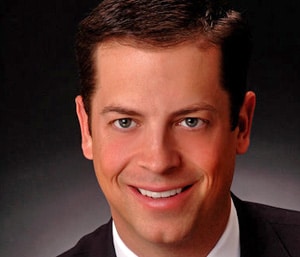
N.M. Supreme Court Chief Justice Charles W. Daniels
In denying prosecutor Matt Chandler’s request that he recuse himself from matters related to the bribery case against Judge Mike Murphy, Chief Justice Charles W. Daniels revealed allegations that Chandler has played politics in an attempt to gain an advantage in the case
The chief justice of the N.M. Supreme Court won’t recuse himself from maters related to the bribery case against District Judge Mike Murphy; he says the request that he do so contains “factual misrepresentations” and “unsupported attacks.”
And in Charles W. Daniels’ 40-page order and opinion rejecting prosecutor Matt Chandler’s request that he stay away from the Murphy case, Daniels revealed that Chandler faces allegations of playing politics in an attempt to gain an advantage in the case – allegations Chandler says are false.
Earlier this month Chandler filed the motion seeking Daniels’ recusal, arguing that the chief justice’s prior actions and statements, and a rumor that a campaign contribution from his wife may have bought his appointment to the high court, created a negative appearance.
Daniels has denied the rumor about his appointment in a previous interview with NMPolitics.net. He shot down that allegation again on Wednesday, along with the rest of Chandler’s motion. In his strongly worded and pointed order, Daniels admitted to being “disappointed and concerned” by and about Chandler’s conduct, “as any judge should be.” But he said he is “confident that I am not so personally embroiled that I will be biased against the State itself.”
Read the full order here.
Former employee accuses Chandler of ‘judge shopping’
In the order, Daniels includes an affidavit from a former prosecutor in Chandler’s office. That former employee, Kirk Chavez, alleges that Chandler sought to have an earlier judge who Daniels assigned to the case disqualified by releasing a public statement that would imply collusion between Daniels and Murphy’s attorney, Michael Stout.
The intent, Kirk Chavez wrote in the affidavit he sent Daniels last week, was to pressure Daniels into appointing “a more conservative, and hopefully Republican judge” to the case against Murphy, who is a Democrat.

Ninth Judicial District Attorney Matt Chandler
In March, Daniels appointed District Judge J.C. Robinson of Silver City, a Democrat, to oversee pre-grand jury matters in the case. Chandler, a Republican, says the appointment came a day after Stout suggested to him that a judge from Silver City should preside over such matters.
Chandler stated in his motion seeking the Democrat Daniels’ recusal that he was “quite concerned about the ‘coincidence’” and submitted a motion to Daniels to withdraw the appointment of Robinson, saying the situation “at least suggested the appearance of impropriety.” Daniels denied that motion.
Daniels stated in his order that he “did not collude with defense counsel Michael Stout or anyone else in my selection of Judge Robinson.” He said when he appointed Robinson he had never spoken with Stout and didn’t know whether Murphy had an attorney.
Chavez’s affidavit contains serious allegations against Chandler. You can read the affidavit on pages 42 and 43 of Daniels’ order. Here’s how Daniels summed it up:
“As Mr. Chavez states in his own words, the allegations by Mr. Chandler of impropriety on my part, or Judge Robinson’s part, or defense counsel’s part were neither factually based nor made in good faith. My Chandler’s former deputy prosecutor candidly admits that he and Mr. Chandler knew they ‘had no facts to support (their) conclusion that Judge Robinson’s political affiliation would dictate how he would rule in their case’ (Paragraph 12); that they were doing so as a ‘judge shopping’ tactic to pressure me into appointing ‘a more conservative, and hopefully Republican judge’ (Paragraphs 14 and 15); that they ‘had no facts whatsoever, or any evidence of any kind that Chief Justice Daniels had colluded with Mr. Stout in the appointment of Judge Robinson’ (Paragraph 19); that they ‘believed that the accusation of collusion alone would apply enough pressure on the Chief Justice to withdraw the appointment of Judge Robinson’ (Paragraph 20); that ‘Mr. Chandler and (Mr. Chavez) both agreed that at least the accusation, which (they) know was not supported by any facts or evidence, was in a document that would one day be made public’ (Paragraph 22); that their ‘actions were intended to curve the playing-field to have a judge that would be more favorable to the prosecution of Judge Mupr(h)y be appointed to the case’ (Paragraph 23); and that he and Mr. Chandler ‘were aware that (their) actions impugned the reputations and integrity of Chief Justice Daniels and Michael Stout; however (they) decided to utilize that strategy to hopefully gain an advantage in the case’ (Paragraph 24).”
Chandler says allegations are ‘not true’
Last week’s affidavit isn’t the first time Chandler has faced allegations from Chavez, who appeared on behalf of the state at one early hearing in the case. At a later, closed-door hearing before Murphy was indicted in May, NMPolitics.net saw Chavez standing outside with a private attorney.
NMPolitics.net witnessed Lawrence Pickett, a Las Cruces attorney who said he was part of Murphy’s defense team, approach Chavez outside the hearing. Pickett thanked Chavez for his courage and honesty, but didn’t elaborate.
Soon thereafter, Robinson called Chavez into the hearing to testify. Afterward, Chavez refused to comment on the situation. Chandler confirmed later that day that Chavez no longer worked for his office, but he would not comment further.
On Wednesday, Chandler told NMPolitics.net that the allegations contained in the affidavit Chavez provided Daniels are “not true.” He also confirmed that Chavez has leveled accusations at him before.
“Justice Daniels is relying on unsubstantiated information provided by a former employee, who is the same former employee with information that Judge Robinson and Judge Smith have already declared on the record to be unsubstantiated, unreliable and irrelevant,” Chandler said.
Judge Leslie Smith has been assigned to the case since a grand jury indicted Murphy in May.
It’s clear now that allegations from Chavez have been an issue in the Murphy case, but consideration of those allegations has taken place largely in secret. Chandler said he couldn’t comment on whether the accusations Smith and Robinson considered were similar to those contained in the affidavit Chavez sent Daniels. Chandler said the order Robinson issued related to Chavez is sealed.
Daniels disputes Chandler’s version of chance encounter
As to Daniels’ rejection of his request for recusal, Chandler said he stands by his motion, which he said was “based upon a reasonable perception that there may be a conflict of interest.” But he said he accepts the chief justice’s decision.
“It puts this issue to rest, and it’s time to focus on the facts and take this case to trial,” Chandler said.
Daniels went into a great deal of detail in his order and opinion in an attempt to put the issue to rest. He stated that such explanation is necessary “when the motion is based on widely publicized misstatements about the true facts or misrepresentations of the applicable legal principles.”
One of the incidents Chandler cited as grounds for Daniels’ recusal was a chance encounter between the two in June. The day Murphy was arrested on a new charge relating to his solicitation of District Judge Lisa Schultz’s vote to make Douglas R. Driggers the chief judge in Las Cruces, Chandler says he spotted Daniels talking on his cell phone at a coffee shop inside the Buffalo Thunder resort outside Santa Fe. Statements he overheard led Chandler to believe Daniels was talking about Murphy’s arrest – before information about the arrest had been released to the public.
Among the statements Chandler says he overheard was, “what’s next, I mean, are they going to go after us for putting on the left shoe before putting on the right one?” Chandler wrote in his motion that he was “shocked to walk by and hear the chief justice giving his opinion of the case already” – especially in a public setting where his conversation might be overheard.
Daniels disputes Chandler’s account of the situation, saying he was speaking on his phone in an “unoccupied area” down a hallway from the coffee shop. In his order, he characterized Chandler’s overhearing of his conversation as “eavesdropping,” and said when confronted by Chandler following his phone conversation he passed a protruding column “that had concealed Mr. Chandler’s presence from me.”
“I never did set foot in the coffee shop off to one side of the hallway, and I am quite certain nobody in that coffee shop, or anyone else but Mr. Chandler, overheard any of my phone call,” Daniels wrote.
Daniels stated that Driggers called to notify him about Murphy’s arrest as he was walking into Buffalo Thunder. Daniels then called a staffer in his own office about the situation. In response to the staffer asking whether the situation led to him having second thoughts about wanting to be a judge, Daniels stated that he “laughed and replied that sometimes I wonder whether I might be accused of wrongdoing if I put my left shoe on first instead of my right when I get dressed in the morning.”
“If Mr. Chandler perceived that I had questions about the viability of the legal theories implicit in the partial report I had received about Judge Murphy’s June 28 arrest, he certainly is entitled to that perception,” Daniels wrote. “I had never heard of such a legal theory in a bribery case.”
But a judge’s views on legal issues don’t serve as basis to disqualify him, Daniels wrote. Judges should keep an open mind, but not an empty one.
Daniels says rumor about his appointment is ‘patently false’
As to the rumor that Daniels’ wife bought his appointment to the Supreme Court with a $1 million contribution to then-Gov. Bill Richardson – a rumor Murphy is quoted in court documents as spreading – Daniels wrote, “the suggestion is patently false, and there is no evidence to support it, as could have been confirmed through the most minimal investigation.”
He said he and his wife were aware of but have “shrugged off those rumors, realizing that there is no way to keep people from that kind of groundless gossip.”
NMPolitics.net has searched for and found no evidence of a $1 million contribution. According to FollowTheMoney.org, Daniels gave $200 to Richardson’s gubernatorial re-election campaign in 2006. His wife gave $3,000 to Richardson in 2002 and $5,000 to Richardson in 2006. She also gave $2,300 to Richardson’s presidential campaign in February 2007, according to OpenSecrets.org.
No one has publicly accused Daniels or his wife of paying for Daniels’ appointment or claimed to have evidence that it happened.
The case against Murphy
In addition to the felony charge that led to his June arrest, Murphy also faces four felony counts stemming from his May indictment on charges of bribery, intimidation or retaliation against a witness and criminal solicitation. Those charges are based on allegations that Murphy solicited a bribe from potential judicial applicant Beverly Singleman, told Schultz to tell Singleman she needed to pay the bribe, and threatened to destroy Singleman’s reputation for telling others that he solicited a bribe from her.
Murphy has pleaded not guilty to all charges. His trial is set for February.
Stout had no comment on Daniels’ order.
